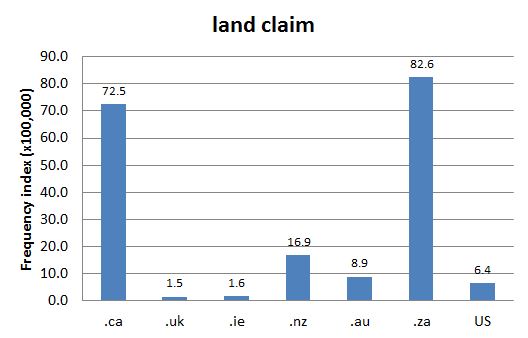DCHP-2
land claim DCHP-2 (October 2016)
n. — usually Aboriginal, Law
a claim made by an Aboriginal group to use or own a particular area of land.
Type: 4. Culturally Significant — Land claim may be used to denote assertion of land ownership in any context, but in Canada the term is usually associated with claims by Aboriginal nations. There are two kinds of land claims, comprehensive land claims and specific land claims, instituted by the Canadian government in the early 1970s (see Parliament of Canada reference).
Land claims in Canada have particular historical significance because of the complex and controversial nature of government dealings with Aboriginal land use and ownership. Aboriginal land rights issues were first addressed on a large scale by the Royal Proclamation of 1763, which reserved land for use by Aboriginal peoples west of a line drawn along the Appalachians, sometimes referred to as the "Proclamation line". As settlers moved to Canada, the British and then Canadian governments concluded treaties, often with unfavourable terms, that gradually dispossessed Aboriginal people of their lands (see Canadian Encyclopedia reference). In British Columbia, only a few treaties were made on Vancouver Island and in the far north.
In the mid-20th century, a growing awareness of these injustices perpetrated against Aboriginal peoples began to increase internationally. Canada was influenced by international measures, such as the creation of the US Indian Claims Commission in 1946 (see Canadian Encyclopedia reference), to deal with these injustices. The 1951 quotation reveals the discourse typical of the time that implied that disrespectful Aboriginal people were about to dispute what was "rightfully" the "white man's" land.
In a 1969 landmark case, the Nisga'a Nation of BC put forward a legal claim to their traditional homelands, which was denied by the BC Supreme Court. The case was taken to the Supreme Court of Canada, which ruled against the Nisga'a on a technicality but recognized their title to the land (see the 1973 quotation). The case triggered debate surrounding issues of Aboriginal title and land ownership and as a result the Canadian Government opened the Native Claims Office in 1973 to deal with these issues (see AANDC reference). While the basic issues remain unresolved (see, e.g., the 1982 quotation), recent years have seen somewhat more respectful interactions (e.g. the 2006 and 2013 quotations). Chart 1 shows the importance of the concept in the Canadian context (as well as in South Africa).
See also COD-2, s.v. "land claim", which is marked "esp. Cdn".See also: comprehensive land claim specific land claim
References:
- AANDC "Resolving Aboriginal Land Claims" Accessed 22 Aug. 2013
- COD-2
- Canadian Encyclopedia s.v. "Comprehensive Land Claims: Modern Treaties" Accessed 26 Apr. 2016
- Parliament of Canada "Specific Claims in Canada" Accessed 22 Aug. 2013
Images:
Chart 1: Internet Domain Search, 22 Feb. 2016
